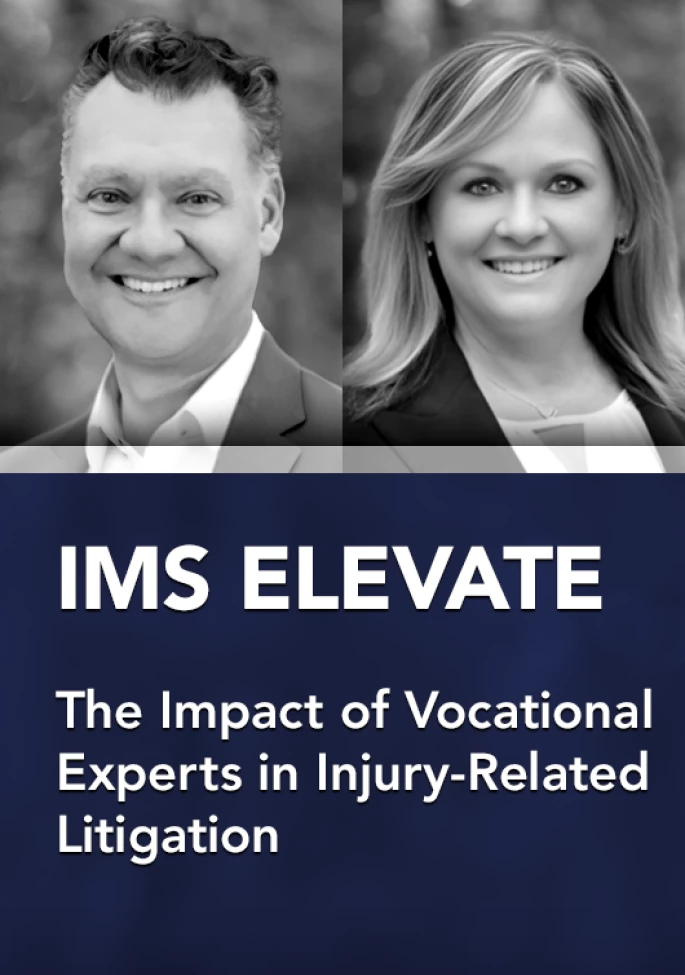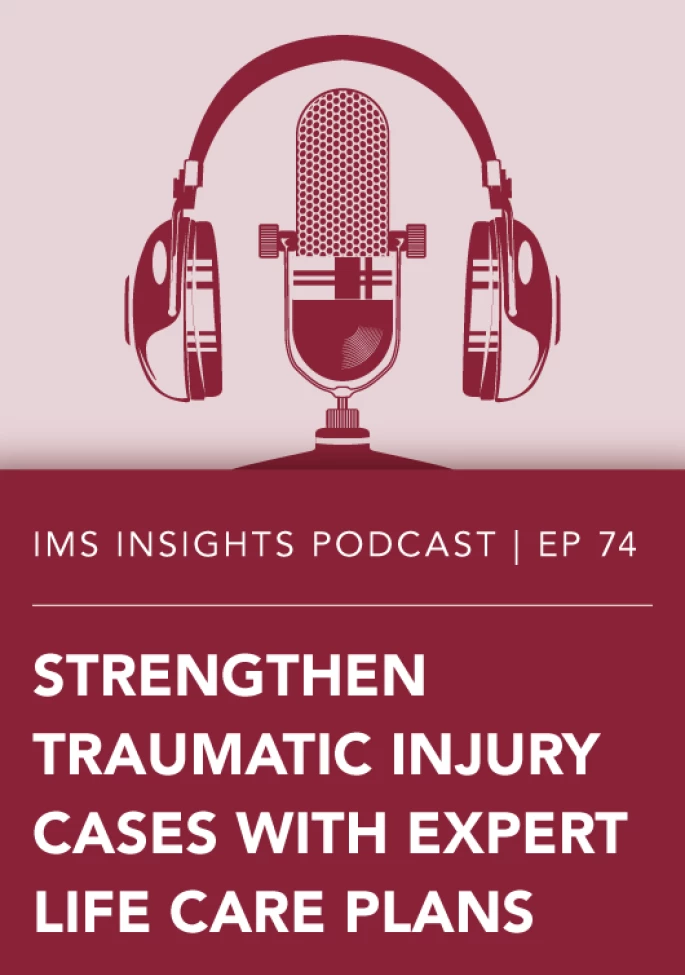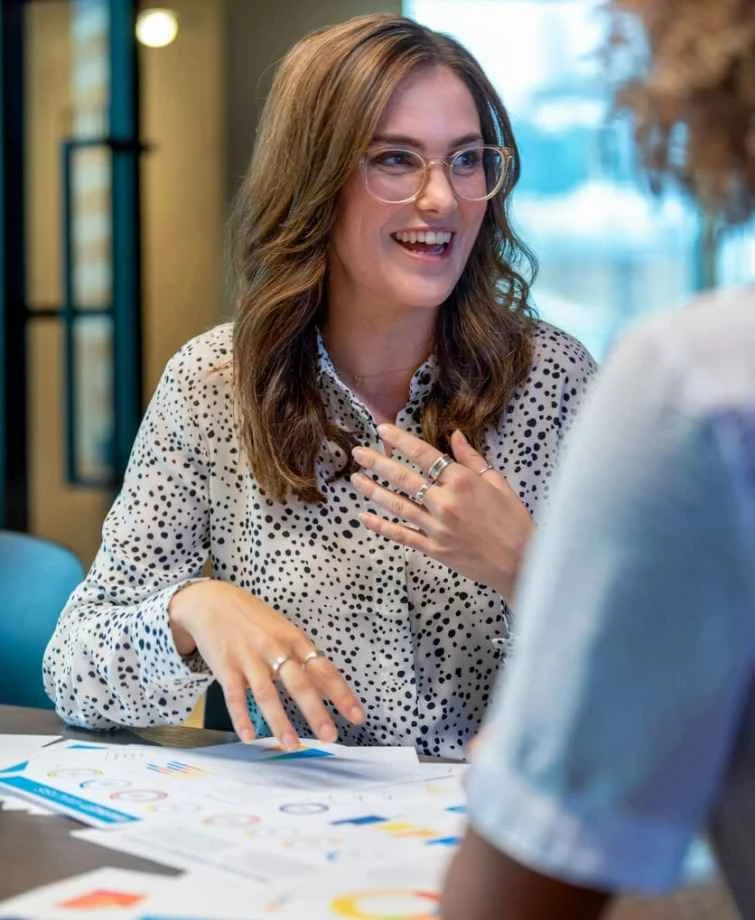In this IMS Insights Podcast, Senior Jury Consulting Advisor Chris Dominic is joined by Lead Life Care Planning and Vocational Expert Kacy Turner, MS, CRC, CVE, CLCP, to discuss the valuable role vocational experts play in traumatic injury litigation. Kacy explains how vocational assessments, through testing, transferable skills analysis, and rehabilitation planning, help attorneys, juries, and judges understand an injured individual’s employability and earning capacity—both past and future.
Kacy also highlights why hands-on job placement experience and recognized credentials are essential for credibility in court, and how collaboration with economists and life care planners strengthens damages analyses. With IMS’s integrated team of specialized experts, plaintiff and defense clients can benefit from comprehensive vocational assessments, life care plans, economic reports, and rebuttals that provide clarity and confidence in injury-related cases.
Watch the original LinkedIn Live recording here.
Adam Bloomberg (Intro): Welcome to the IMS Insights Podcast, where the nation’s leading experts in litigation trends share their insights. Today we have the pleasure of speaking with Kacy Turner, a testifying expert with our Life Care Planning and Vocational team, about her experiences in presenting or challenging vocational damages.
Her team's work encompasses determining pre- and post-injury employability, vocational testing, transferable skills, and jobs analysis, and they also create rehabilitation plans while assessing reasonable accommodations under the Americans with Disabilities Act.
Leading our discussion as always is Chris Dominic, Senior Strategy and Jury Consulting Advisor. Hey, Chris. Good morning.
Chris Dominic: Good morning, Adam. Thanks.
Adam Bloomberg: Handing it over to you.
Chris Dominic: All right. Welcome, Kacy.
Kacy Turner: Thank you.
Chris Dominic: I am really curious to get us started here. What's the biggest misconception that vocational about vocational experts ?
Kacy Turner: Probably whether or not we're actually needed on a case. Many times the attorneys don't even realize what we bring to the table in terms of lost wages in the past and possible future loss of earnings in the future.
Chris Dominic: OK, but that would create a little bit of a hole in the testimony and the evidence, right? You just have the economist opinion without something to connect it.
Kacy Turner: Sometimes we do just have an economist who calculates out the cost or calculates out the future lost wages based on an assumption that the person can no longer work. Many times there are other jobs that somebody can perform, and the vocational consultant's job is to look at the work history, look at the person, look at the industries that they've worked in, and determine what, if any, jobs they can do in the future based on any disability or limitations that they have from the physicians.
Chris Dominic: OK, can't help but think of it as a jury consultant. It just seems like it would. It basically makes the jury the expert on how it really goes though?
Kacy Turner: Yes, they get to understand the job somebody has done. What skills they have and what jobs they could do in the future that they could then go out and become reemployed.
Chris Dominic: OK, so sort of like this. I got the chance to speak with Amy McKenzie about what life care planning experts do and I wanted to ask you, I know you guys are on the same team.
Kacy Turner: Yes.
Chris Dominic: How does your role as a vocational expert differ from that of a life care planner?
Kacy Turner: So a lot of the parts are similar, and our team gets together and reviews medical records so that I will be able to understand as the testifying expert what the injuries are and what type of rehab the person has gone through. We then sometimes use the IMS medical experts to give us restrictions and limitations. I can only look at jobs that somebody is able to do. So if they can't lift 100 lbs. anymore, they can only lift 15. I'm going to be looking at new jobs that they're able to perform, whereas life care plans are really looking at what types of things are they going to need to live independently, to live on their own. And then the second section of that is what can they do now that we've got them as independent as they can be? What can they do in the job market to get back to work, to get more self-esteem and more self-confidence?
Chris Dominic: Got it. OK. So what kind of training or credentials make somebody credible in your field?
Kacy Turner: So, a master's degree in rehabilitation counseling. I personally have some extra classes that I took for vocational evaluation. So I'm able to administer and interpret different vocational tests so that we can determine, you know, what is their educational level? Is this person going to be able to be successful if we put them in some retraining? Maybe they need to go back to college and get a degree. And so my degree has some extra courses and therefore I'm a certified vocational evaluator as well as a certified rehabilitation counselor. And it's really important that you have a certified rehabilitation counselor as your vocational expert.
Chris Dominic: Got it, Thank you. You often also work closely with economists. Setting aside the first question I asked you, what's the collaboration look like and how does it impact the damages analysis?
Kacy Turner: So similar to working with the life care planners, the vocational person kind of works with everybody because we're getting some of the independent living information from the life care planners. And then when it comes time to working with the economist, my job is to say, OK, this person made $100,000 a year, now he can only make $50,000 because they have to change into a different job. I then discuss those findings with the economist, and the economist will calculate those damages out. So if the person is going to have a yearly wage loss, the economist will take that to what we call the work-life expectancy. Some people think of it as your full Social Security retirement age, but there are some other indicators in there that the economist works with to get that work-life expectancy. That's out of my scope of practice. So I give them the life care plan. We give them today's dollars of what that life care plan is worth. And then I give them today's dollars of what somebody could earn. And then we go to the economic team and they cost that out for the rest of somebody's work life.
Chris Dominic: All right, now you've been through Dalbert challenges or you're in Texas, so you've been through Robinson challenges, yes. What helps a vocational expert hold up under scrutiny?
Kacy Turner: So as we talked about the credentials, a master's degree from an accredited university, the certified rehabilitation counseling, the certifications are, are very helpful to know that you're following the standard methodology. We try to, we strive for the Daubert challenge because it's a little bit higher than Robinson. So we strive for the Robinson and we follow the same methodology whether we're doing work for plaintiff attorneys or defense attorneys. We use the same methodology, the same type of analysis for all of our reports. And that holds up pretty well in court.
Chris Dominic: OK, So what advantages do IMS clients have by working with experts like you and your team?
Kacy Turner: So we have, a couple different things that are really good about our company is, we have the ability to do the life care plan, do the vocational report, and do the economic report. So it's kind of like a one+stop shop for an attorney. It makes it a little more cost+effective because they can hire one to two experts. So for somebody like me who can do both a life care plan and a vocational report, they only have to hire one expert, and then they get the economic team as well. We have three or four other experts with our team that are dual-certified as life care planners and vocational counselors. So it makes it a nice place to be able to come and get what you need. Understand that we all work with each other very well. It helps for timings of reports because I will get an economist involved early if I can to say, hey, I need a little help with interpreting these tax returns or looking at the pre-injury earning capacity. So when you work with one company and we've got a full team, it makes it a much more thorough and complete report.
Chris Dominic: That's very helpful. OK, Kacy, I've got a closer for you.
Kacy Turner: OK.
Chris Dominic: If there's one thing attorneys should ask a vocational expert, but often don't, what is it?
Kacy Turner: I would really say it's whether or not the expert has actually worked with disabled clients in job settings, whether they've done job search and job placement. And that means it's somebody who's actually been out looked at jobs, analyzed jobs, worked with employers. Being able to get out there and get in the trenches gives you an idea of how the jobs operate. We look at what types of accommodations can be made for somebody. And so having the experience of being in that warehouse or up inside that truck lets us understand, you know, somebody might not be able to climb steps, but they might be able to get up in a truck, or they might not because it's a pretty big step.
So when you're actually out there working as a rehabilitation counselor with individuals and employers, it gives you that base knowledge that you can then build on with your, your clients that you're working with.
Chris Dominic: Yeah, I'm thinking again, your jury would probably, it would be pretty quick to think that somebody who's ivory tower only for a vocational analysis might be a little bit lower on the credibility rung, right?
Kacy Turner: Yes. I mean, you can do the transferable skills analysis that you've learned on the books, and you can look at the different job descriptions. But if you haven't actually been out there, it's very, it's very interesting that the job description that we use with what's called the Dictionary of Occupational Titles, it's very different than what's actually happening in practicality. So I know that when I'm looking at a receptionist job, they're not just sitting there greeting people these days. They're typing, they're answering phones, they're they may be doing some data entry. So actually observing those jobs really gives you credibility in terms of what can be done with those jobs.
Chris Dominic: Thanks so much for doing this, Kacy.
Kacy Turner: Sure, no problem. Thank you.
Adam Bloomberg (Outro): IMS has served trusted law firms and corporations worldwide for more than 30 years and over 65,000 cases. As a strategic partner for the full case life cycle, our integrated teams provide specialized advisory support, expert witness services, litigation consulting, visual advocacy, and presentation technology to elevate strategies and protect hard-earned reputations. Learn more at imslegal.com.







